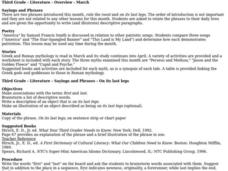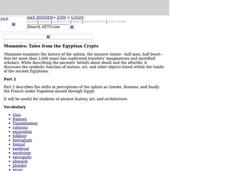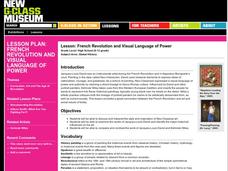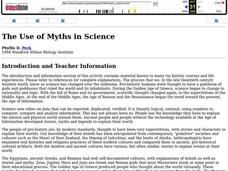Curated OER
Democracy: An Introduction.
Learners study the U.S. Constitutional System and how it compares with forms of democracy that developed in ancient Greece and Rome. They list and explain the requirements it takes to form a society to be considered a nation.
Curated OER
European Festivals
Students explore the diversity of European festivals. In this cultural diversity instructional activity, students visit selected Web sites to research ancient festivals, the Edinburgh Fringe, and the Glastonbury. Students may organize...
Curated OER
Looking at Gods, Goddesses, and Heroes
Students read about a god, goddess, or hero and compare two images of him or her.
Curated OER
Ancient Cultures - Greek
Students examine the culture of the Greek with a focus on how they decorated their homes. As a class, they watch a PowerPoint presentation and complete an outline. To end the lesson, they draw their own sketch of a Greek chair using...
Curated OER
social Studies: Yesterday, Today, and Tomorow
Sixth graders take an Internet trip back in time to explore ancient cultures. Working in teams, they assume the roles of theologian, cartographer, economist, political analyst, and anthropologist. The same groups then create time...
Curated OER
Spice Container
Sixth graders examine and identify classic Greek and Roman motifs on spice containers. They analyze the process of casting and chiseling silver, and design and create a spice container using classic Greek and Roman design elements.
Curated OER
Literature
Third graders study phrases, poetry and myths of Ancient Greece and Rome in these lessons.
Curated OER
Primary Sources and Archaeology in the Study of Ancient Mediterranean Trade
Tenth graders begin the lesson by plotting trade routes, major empires and items traded. Using primary sources, they examine their own values regarding trading items for royality. They participate in a role-play exercise in which they...
Curated OER
Create a Board Game
Students research, design, and create a game board based on information learned in ancient civilizations' social studies units. They utilize computer technology to research the project, as well as, textbooks, in-class library and video...
Curated OER
Who Built the Pyramids?
High schoolers examine the two theories on how the pyramids at Giza were built. They watch a video on pyramids, take notes, and write a five-paragraph essay on how they think the pyramids were constructed.
Curated OER
The Alphabet is Historic
Students describe how the Phoenicians, Greeks and Romans passed down the alphabet through the generations. They compare and contrast the letters from early alphabets to the one of today and discuss how they are different. Using a map,...
Curated OER
Italian Renaissance
Fifth graders explore the Italian Rensissance in this six lessons unit. The prominent citizens, the ideas, values, art, philosophy, and literature of the are seen as a rediscovery of Ancient Greek and Roman times.
Curated OER
Mummies: Tales from the Egyptian Crypts Part II
Young scholars explore the shifts in perceptions of the sphinx as Greeks, Romans, and finally the French under Napoleon moved through Egypt.
Curated OER
Greek mythology (characteristics and features)
Students recognize the features and characteristics of myths, the role myths played in Greek culture, and choose a writing project. In this Greek mythology lesson, students are introduced to Greek mythology and work in cooperative...
Curated OER
Scientific and Cultural Advancements of Early China
Seventh graders explore early Chinese civilization. As pupils study Chinese history, they examine its scientific accomplishments. In partners, 7th graders create an advertisement presentation for an advancement of ancient China.
New Class Museum
Lesson: French Revolution and Visual Language of Power
Take a look at the French Revolution and neo-classic art, then compare it to current social issues and contemporary art. Kids analyze several pieces painted by Jacques-Louis David in regard to style and subject then compare them to...
Curated OER
Identifying the Characteristics of a Myth
For this lesson created specifically to integrate the use of the SMART Board, Students view a variety of animated myths in order to create a web that identifies the characteristics of a myth. Then Students choose a myth from selected...
ESL Library
Beginner Level Thanksgiving ESL Lesson Plan
Thanksgiving is a cherished tradition in the United States and Canada. Introduce the beginnings of the Thanksgiving celebration with a resource that features reading comprehension activities, vocabulary exercises, and a short...
Curated OER
Referencing the Classical Past
Students explore the concept of myths conveyed through art. In this art history lesson plan, students examine "Three Goddesses" and discuss the state of the world at the time that Nollekens created the sculptures as they analyze the...
Curated OER
The Use of Myths in Science
Learners are told stories, myths and legend to explain their world. After telling the tales and discussion them, students are assigned to write a myth that describes a familiar situation, such as why the school garbage cans are always...
Curated OER
The Use of Myths in Science
Students examine folk tales to determine the basis for scientific myths. They demonstrate through the discussion of the folk tales that the perception of the world has changed as new information is gained. They write their own folk...
Curated OER
Our Changing View of the Solar System
Students identify and name the eight planets and the five dwarf planets in our solar system. In this space science lesson, students view a slideshow of the planets and label them on an included Solar System chart.
Curated OER
Greek Theater Masks
Sixth graders learn the importance of mask in Greek theater, explore the history of Greek theater, integrate planning - design and construct a mask that shows exaggeration of features, build up features using paper mach mash, enhance...
Curated OER
Compare and Contrast Timelines of the World
Seventh graders create a classroom timeline of important world events. This lesson is meant to be used during the entire school year. As the school year goes along, events are added to the timeline as chosen by the class. The events are...

























